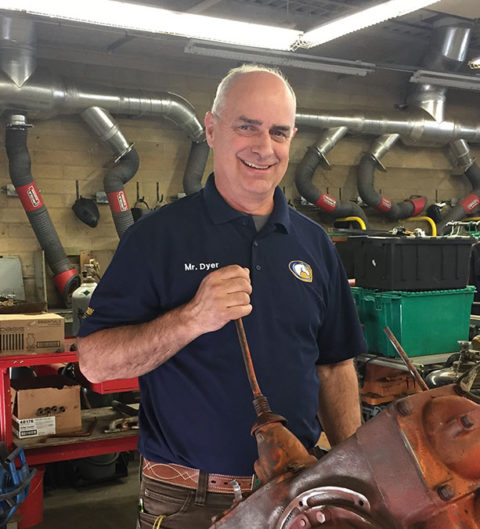“Student success is based on relevance, rigor and relationship.”
After serving as a greenskeeper, a driver of farm equipment, a hardware store sales clerk and manager of a landscape business, Eric Dyer transitioned to education. With three decades’ experience teaching everyone from kindergartners to college students at the University of California, Davis, Dyer currently teaches agriculture mechanics and horticulture at Woodland Senior High School in Woodland, California. As a California Certified Florist, Dyer also adjuncts at a community college.
Dyer matches his high school course curriculum to labor market data, adjusting coursework and outfitting the shop to provide students the latest skills and knowledge. Throughout the four-year agriculture pathway, students pursue project-based learning, FFA competitions, local county fair projects, internships of up to 150 hours a year (including through the Harbor Freight Fellows program, funded by Harbor Freight Tools for Schools), mentorships and job shadows at companies ranging from Holt Agriculture Solutions to the University of California Davis.
Dyer dedicates himself to students others might see as challenging, teaching them physics, building their confidence and even helping them pursue civil engineering degrees at four-year institutions. To support his students literally from the ground up, Dyer rebuilt the school’s horticulture laboratory, animal science school farm and a fully mechanized agricultural shop. “These improvements have sparked new and excited passion amongst our students,” Dyer said.
Every single student in Dyer’s program graduates, compared to a statewide graduation rate of 83 percent. CTE pathway completers receive a “diploma plus” to reflect that accomplishment and to demonstrate their industry certifications. In 2018, of the 41 seniors who completed three or four years of agriculture classes, 23 pursued employment or further education in agriculture.
Beyond his high school students, Dyer also teaches teachers. Through the California Agriculture Teachers Association (CATA), he trains new instructors and writes statewide curricula, including how to construct greenhouses on campus. He has also been a Perkins grant administrator for the California Department of Education. He is a recipient of the National FFA Honorary American Degree and CATA’s Agriculture Teacher of Excellence award.
“I seek to reach out to meet each young person at their point of need. From there, creating a relationship, we can only build. I talk and teach as I want to be spoken to and taught. Straight talk.”
